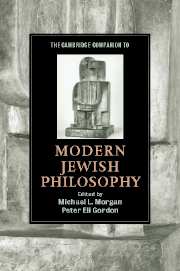Book contents
- Frontmatter
- 1 Introduction: Modern Jewish Philosophy, Modern Philosophy, and Modern Judaism
- 2 Baruch Spinoza and the Naturalization of Judaism
- 3 The Liberalism of Moses Mendelssohn
- 4 Jewish Philosophy after Kant The Legacy of Salomon Maimon
- 5 Hermann Cohen: Judaism and Critical Idealism
- 6 Self, Other, Text, God: The Dialogical Thought of Martin Buber
- 7 Franz Rosenzweig and the Philosophy of Jewish Existence
- 8 Leo Strauss and Modern Jewish Thought
- 9 Messianism and Modern Jewish Philosophy
- 10 Ethics, Authority, and Autonomy
- 11 Joseph Soloveitchik and Halakhic Man
- 12 Emmanuel Levinas: Judaism and the Primacy of the Ethical
- 13 Emil Fackenheim, the Holocaust, and Philosophy
- 14 Evil, Suffering, and the Holocaust
- 15 Revelation, Language, and Commentary: From Buber to Derrida
- 16 Feminism and Modern Jewish Philosophy
- Bibliography
- Index
3 - The Liberalism of Moses Mendelssohn
Published online by Cambridge University Press: 28 September 2007
- Frontmatter
- 1 Introduction: Modern Jewish Philosophy, Modern Philosophy, and Modern Judaism
- 2 Baruch Spinoza and the Naturalization of Judaism
- 3 The Liberalism of Moses Mendelssohn
- 4 Jewish Philosophy after Kant The Legacy of Salomon Maimon
- 5 Hermann Cohen: Judaism and Critical Idealism
- 6 Self, Other, Text, God: The Dialogical Thought of Martin Buber
- 7 Franz Rosenzweig and the Philosophy of Jewish Existence
- 8 Leo Strauss and Modern Jewish Thought
- 9 Messianism and Modern Jewish Philosophy
- 10 Ethics, Authority, and Autonomy
- 11 Joseph Soloveitchik and Halakhic Man
- 12 Emmanuel Levinas: Judaism and the Primacy of the Ethical
- 13 Emil Fackenheim, the Holocaust, and Philosophy
- 14 Evil, Suffering, and the Holocaust
- 15 Revelation, Language, and Commentary: From Buber to Derrida
- 16 Feminism and Modern Jewish Philosophy
- Bibliography
- Index
Summary
“Judaism is not Thomas Jefferson.” With this terse epigram, Rabbi Meir Kahane contemptuously brushed off an American television interviewer who betrayed more than a little skepticism, back in the 1980s, about Kahane’s calls for the revocation of Israeli Arabs' citizenship. As odious and indefensible as Kahane’s racist politics were, one has to acknowledge at least the partial validity of his argument. Prior to the Enlightenment, Judaism evinced no recognition of the equal political rights of all men, regardless of their creed or national origin. During the two centuries prior to the advent of Kahane, however, Jewish thinkers of various stripes made strenuous efforts to align themselves with the spirit of modern times. They reinterpreted their religious tradition in the light of the liberal political teachings that had brought them out of the ghetto and had otherwise been so beneficial to themselves as well as others. In the United States, in particular, they succeeded so well at this task that most Jewish viewers of that interview with Kahane must have been shocked and outraged by what sounded to them like a heretical statement.
Nevertheless, however much one might wish to believe that Kahane was an isolated representative of a retrograde attitude, one has to admit that he is far from the only spokesman for traditional Judaism who has in recent years sought to drive a wedge between his religion and modern liberal ideas. The Israeli religious right is well stocked with such figures, and their views have been echoed - albeit rather weakly - in the Diaspora as well. In response to their critiques of liberalism, other traditional Jewish thinkers have grappled with the tension between their heritage and currently regnant political ideologies.
- Type
- Chapter
- Information
- The Cambridge Companion to Modern Jewish Philosophy , pp. 35 - 52Publisher: Cambridge University PressPrint publication year: 2007
- 2
- Cited by

